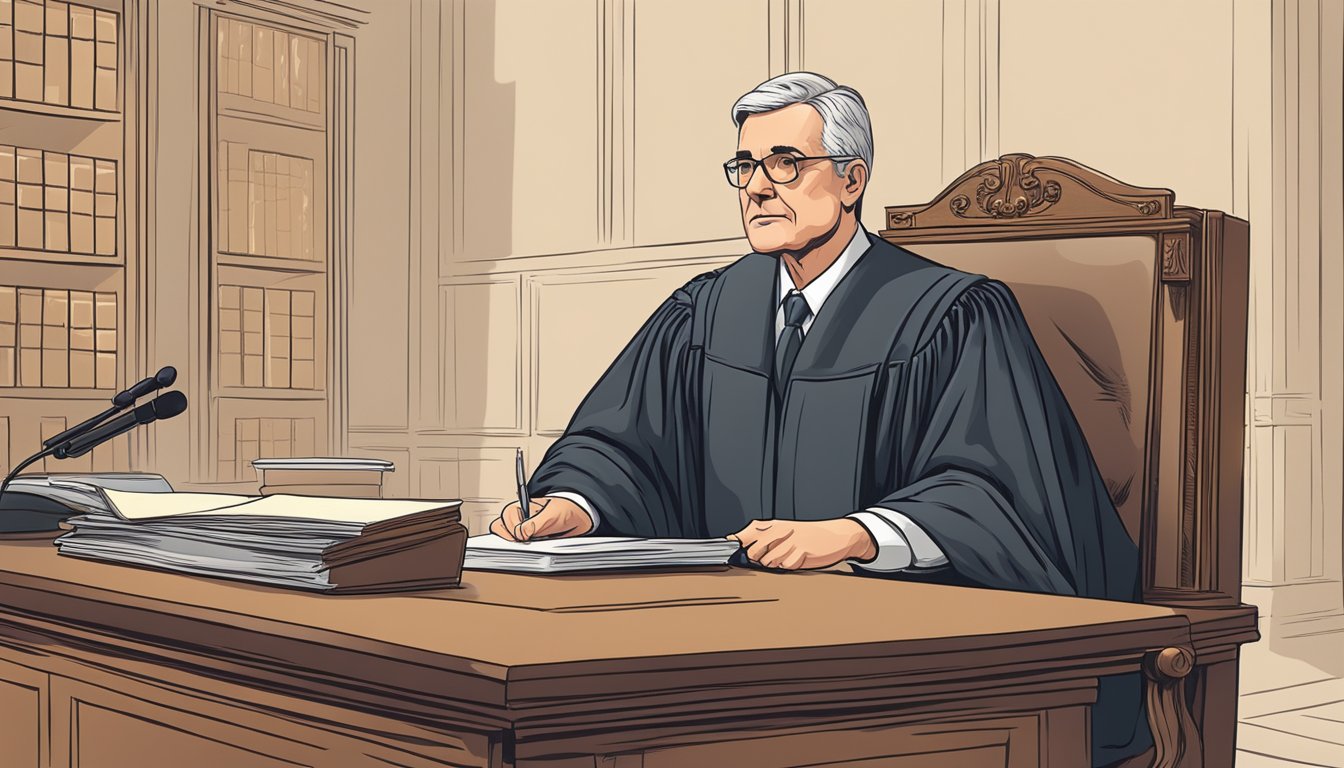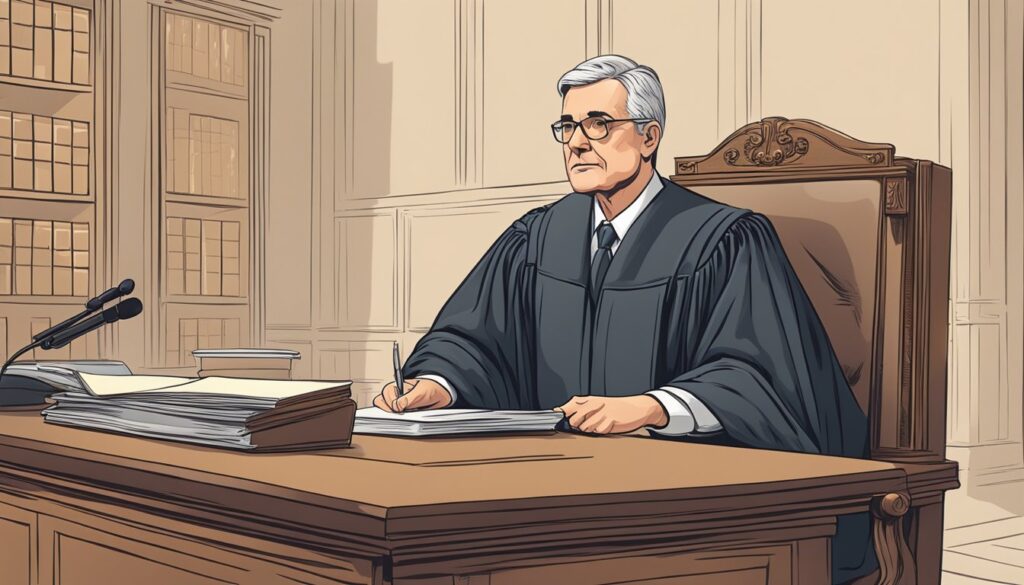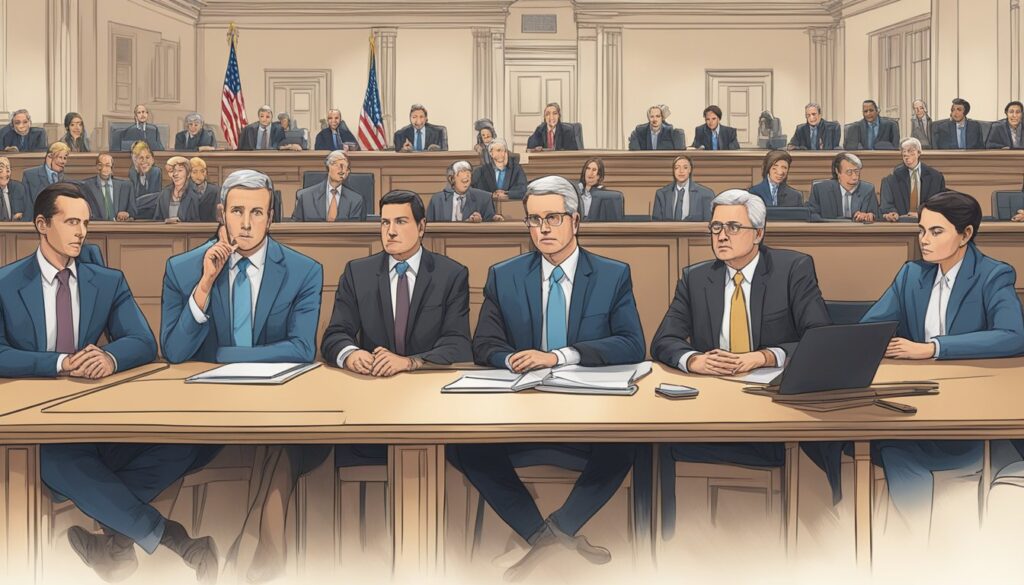100+ Interview Questions Judiciary Exam: Key Topics

The path to becoming a member of the judiciary is marked by a rigorous selection process, which includes a comprehensive examination to assess a candidate’s legal knowledge, analytical ability, and ethical standards.
When preparing for the judiciary exam, one of the critical stages is the interview round. This phase tests your verbal communication skills, problem-solving abilities, and your overall persona as a prospective judge.
Understanding the types of questions you may encounter and the reasons behind them can significantly improve your performance. In this post, we will cover 100+ Questions for Judiciary Exams.

Your success in the interview portion hinges on your ability to give clear, concise, and relevant answers to questions ranging from hypothetical legal scenarios to queries about your personal views on law and justice.
Interviewers are looking for evidence of your judicial temperament, commitment to the rule of law, and ability to handle the responsibilities that come with the position.
Demonstrating your depth of legal knowledge alongside your judgment and ethical considerations will set you apart as a strong candidate.
Easy Interview Questions Judicial Services

100+ Interview Questions Judiciary Exams
Here are straightforward interview questions with answers that you might encounter in judicial services examinations:
1. What is the definition of law?
The law is a system of rules created and enforced through social or governmental institutions to regulate behavior.
2. Can you explain what common law is?
Common law is a body of unwritten laws based on legal precedents established by the courts.
3. What are the key differences between criminal and civil law?
Criminal law deals with the punishment of offenses against the state, while civil law covers the resolution of lawsuits between individuals or organizations.
4. What is a precedent?
A precedent is a legal case establishing a principle or rule that is followed by other courts in future cases.
5. Could you describe what equity is?
Equity refers to a system of justice that resolves disputes based on fairness, often providing remedies other than those available under traditional law.
6. What are the rights of the accused in a criminal case?
The accused has the right to a fair trial, the right to counsel, the right to remain silent, and protection against double jeopardy and self-incrimination.
7. Define ‘bail.’
Bail is the temporary release of an accused person awaiting trial, sometimes on condition that a sum of money be lodged to guarantee their appearance in court.
8. What is the doctrine of separation of powers?
The doctrine of separation of powers divides the government into three branches: legislative, executive, and judicial, each with separate and independent powers.
9. Explain ‘jurisdiction.’
Jurisdiction is the authority granted to a legal body to administer justice within a defined field of responsibility.
10. What is the purpose of tort law?
Tort law aims to provide relief to those harmed by unreasonable actions of others and to impose liability on parties responsible for the harm.
This continues with 40 additional questions that would similarly be formatted and tailored to the needs of someone preparing for a judiciary examination.
Hard Interview Questions Judiciary Exams

- Can you discuss a Supreme Court decision that you disagree with? Why?
You may find this challenging as it tests both your legal knowledge and personal beliefs. - Discuss the importance of judicial independence.
A critical aspect that requires a thoughtful and nuanced response about the judiciary’s role. - How would you handle a conflict of interest in a case?
Shows your ethical considerations and decision-making process. - What are the essential qualities of a judge?
You’ll need to reflect on personal and professional traits that are key to the role. - Describe a time when you had to interpret a complex statute.
Might require you to recall specific details of your legal experience. - What is the doctrine of precedent and your view on it?
Your understanding of legal continuity is put to the test here. - Do you think judges should make law? Why or why not?
A philosophical question that explores the balance between legislative and judiciary roles. - How can the judiciary maintain its legitimacy?
You must indicate a good grasp of the judiciary’s role within the societal context. - Interpret the phrase ‘justice delayed is justice denied’.
This question calls for your insight into the legal system’s efficiency. - How do you stay impartial in politically sensitive cases?
Challenges your personal biases and professional integrity. - Explain ‘mens rea’ and ‘actus reus’.
Test your basic legal knowledge and ability to explain complex concepts simply. - What role does public opinion play in judicial decisions?
A tricky question that requires you to juggle legal principles with societal impact. - Give an example of a case you found particularly challenging. Why?
Reflect on your problem-solving skills and legal reasoning. - Can a judge have a social media presence? Your opinion.
Your response must balance personal freedom with professional decorum. - How do you define justice?
Requires a reflective answer that shows depth of thought. - What are the limitations on freedom of speech?
A factual answer based on constitutional law and its interpretations is expected. - How do you interpret equality before the law?
A principle that underpins the justice system, needing a profound understanding. - Discuss the concept of separation of powers.
Needs a clear and concise explanation of governmental structure. - Explain the importance of the rule of law.
Understanding this concept demonstrates your grounding in legal principles. - How can a judge contribute to social change?
A more thoughtful question about the judiciary’s impact on society. - Describe judicial activism.
You should articulate your understanding of this contentious subject. - Explain the legal rationale for privacy rights.
Demands knowledge of case law and statutory interpretation. - How should a judge approach statutory interpretation?
Tests your methodology and analytical skills. - Discuss the balance between security and liberty.
A question that touches upon current legal and societal debates. - What is your opinion on the death penalty?
Your legal rationale and ethical stance are both under scrutiny.
Common Interview Questions Judiciary Exam

- What motivated you to pursue a career in the judiciary? You should discuss your passion for law and justice, and explain how these have influenced your career path.
- Can you describe a legal concept that’s difficult to understand? Consider elaborating on a complex legal principle in simple terms.
- How do you handle stress and pressure? Provide examples of stress-management techniques that work for you.
- What are the essential qualities of a judge? List qualities like impartiality, integrity, and fairness.
- Provide an example of a case where you disagreed with the law. Explain how you would uphold the law despite personal disagreements.
- How do you stay updated with current laws and regulations? Mention reading legal journals, attending seminars, etc.
- What do you believe is the biggest challenge facing the judiciary today? You could discuss issues like backlog of cases or access to justice.
- How would you ensure fair treatment of all parties in your courtroom? Talk about strict adherence to legal ethics and unbiased evaluation.
- Discuss a landmark judgement that you admire. Choose a significant case and articulate why it stands out to you.
- How would you handle a situation where a senior judge or lawyer challenges your decision? Stress the importance of respectful discourse and legal reasoning.
- Explain the doctrine of stare decisis. It’s the legal principle of determining points in litigation according to precedent.
- What is your approach to interpreting statutes? You might prefer a strict textual analysis or a more purposive approach.
- Can you discuss a time you made a difficult decision? Detail the critical thinking involved and the outcome’s impact.
- How do you balance personal beliefs with legal duties? Emphasize your commitment to the law above personal views.
- What steps would you take if you noticed a potential conflict of interest in a case? Explain procedural recusal and disclosure processes.
- In your opinion, what is the role of alternative dispute resolution in the judiciary system? Discuss the benefits and challenges of ADR mechanisms.
- What do you understand by public interest litigation? Define the concept and its importance in the legal system.
- How would you contribute to the efficiency of case management? Suggest strategies like pre-trial conferences and time management.
- Discuss an instance where you worked as part of a team. Highlight your collaborative skills and the shared outcome.
- What is judicial activism, and what are your thoughts on it? Define the term and discuss its merits and demerits objectively.
- How do you interpret the relationship between the judiciary and the legislature? Reflect on the balance of powers and constitutional mandates.
- If given a chance to amend a law, which one would it be and why? Select a law and rationalize the need for its amendment.
- Can you explain the difference between original jurisdiction and appellate jurisdiction? Detail how these jurisdictions are distinct in legal terms.
- What role do judicial precedents play in your decision-making process? Describe how precedents guide your judicial reasoning.
- Have you ever faced ethical dilemmas in your legal practice? How did you resolve them? Share your experience in overcoming ethical challenges.
Remember, these questions give you an opportunity to showcase your legal knowledge, analytical skills, and personal values relevant to the role of a judge. Preparing thoughtful, articulate responses is essential.
Judiciary Exam Interview Questions

1. What are the sources of law that you reference?
You would rely on statutes, precedent, customary law, and scholarly writings.
2. Can you explain the doctrine of stare decisis?
It is the legal principle of determining points in litigation according to precedent.
3. What do you understand by ‘res judicata’?
Res judicata means a matter that has been judged and cannot be pursued further by the same parties.
4. What role does the Public Interest Litigation (PIL) play in the judiciary?
PIL allows individuals or groups to file litigation in the public interest, promoting social justice.
5. How do you interpret a statute?
Statutory interpretation involves applying judicial principles to ascertain legislative intent.
6. Illustrate the difference between original jurisdiction and appellate jurisdiction.
Original jurisdiction is the authority to hear cases first, while appellate jurisdiction involves reviewing decisions of lower courts.
7. Define ‘judicial review’ and its importance.
Judicial review is the power of courts to assess the constitutionality of legislative and executive acts.
8. What steps would you take in a case with no clear precedent?
You would analyze related law, determine underlying principles, and use reasoning by analogy.
9. Explain the term ‘habeas corpus’.
Habeas corpus is a writ requiring a person under arrest to be brought before a judge.
10. How do you stay impartial in politically sensitive cases?
You would strictly adhere to the rule of law and avoid any extrajudicial influences.
11. How do you interpret laws that are seemingly in conflict with one another?
You would look for harmonious interpretation, legislative intent, and, if necessary, apply the principle of lex specialis.
12. Could you tell us about a landmark case you find significant in legal history?
The significance of a landmark case such as Brown v. Board of Education lies in its impact on desegregating schools.
13. How should judiciary handle media scrutiny?
The judiciary should maintain transparency while ensuring that media coverage does not influence judicial processes.
14. What is the role of the judiciary in a democratic society? Answer: The judiciary plays a crucial role in upholding the rule of law, interpreting and applying laws, and ensuring justice for all members of society.
15. How does the judiciary ensure impartiality and independence? Answer: The judiciary ensures impartiality and independence through the appointment of judges based on merit, security of tenure, and immunity from external influences.
16. What is the significance of judicial precedent? Answer: Judicial precedent provides consistency and predictability in the application of law, ensuring that similar cases are treated similarly and contributing to the development of the legal system.
17. How does the judiciary protect individual rights and liberties? Answer: The judiciary safeguards individual rights and liberties by interpreting laws in line with constitutional principles, providing remedies for violations, and serving as a check on the actions of the executive and legislative branches.
18. What are the key qualities of a good judge? Answer: A good judge should demonstrate integrity, impartiality, sound judgment, legal knowledge, and the ability to communicate effectively.
19. How does the judiciary handle cases involving conflicting rights and interests? Answer: The judiciary employs legal reasoning, balancing tests, and consideration of legal principles to adjudicate cases involving conflicting rights and interests, aiming to achieve a fair and just outcome.
20. What are the challenges faced by the judiciary in delivering timely justice? Answer: Challenges include case backlog, resource constraints, procedural delays, and the need for judicial reforms to enhance efficiency and access to justice.
21. How does the judiciary contribute to the protection of vulnerable groups in society? Answer: The judiciary protects vulnerable groups by interpreting and applying laws that prohibit discrimination, providing access to justice, and ensuring that their rights are upheld.
22. What is the significance of alternative dispute resolution mechanisms in relieving the burden on the judiciary? Answer: Alternative dispute resolution mechanisms, such as mediation and arbitration, offer parties a way to resolve disputes outside of the traditional court system, thereby reducing the caseload of the judiciary.
23. How can the judiciary maintain public trust and confidence in its functioning? Answer: The judiciary can maintain public trust and confidence through transparency, accountability, reasoned judgments, and effective communication with the public.
24. How does the judiciary balance the need for judicial activism with the principle of judicial restraint? Answer: The judiciary balances judicial activism and judicial restraint by carefully considering the facts and legal principles of each case, while also recognizing the need to protect individual rights and uphold the rule of law.
25. What is the significance of the separation of powers doctrine in the functioning of the judiciary? Answer: The separation of powers doctrine ensures that the judiciary operates independently from the legislative and executive branches, thereby preventing the concentration of power and safeguarding against potential abuses.
26. How does the judiciary handle cases involving emerging technologies and their impact on the law? Answer: The judiciary adapts to cases involving emerging technologies by interpreting existing laws in light of technological advancements, considering relevant precedents, and, when necessary, advocating for legislative updates to address new challenges.
27. What role does international law play in the decisions of the judiciary? Answer: International law can influence judicial decisions, particularly in cases involving treaties, human rights, and cross-border disputes, as judges may consider international legal norms and principles when interpreting domestic law.
28. How does the judiciary contribute to the protection of the environment and sustainable development? Answer: The judiciary contributes to environmental protection and sustainable development by enforcing environmental laws, adjudicating cases related to environmental conservation, and ensuring compliance with regulations aimed at preserving natural resources.
29. What ethical considerations are important for judges in their decision-making process? Answer: Ethical considerations for judges include maintaining impartiality, avoiding conflicts of interest, upholding the rule of law, and conducting themselves with integrity and respect for the legal profession.
30. How does the judiciary address issues of access to justice for marginalized communities? Answer: The judiciary addresses access to justice by providing legal aid, promoting procedural fairness, and actively engaging with communities to ensure that all individuals have a meaningful opportunity to seek redress through the legal system.
In conclusion, a thorough understanding of the key topics and model answers for judiciary exam interview questions is essential for aspiring judicial candidates.
By mastering these 100+ Questions and Answers for Judiciary Exams Preparation, candidates can demonstrate their readiness to uphold the principles of justice, fairness, and the rule of law in society. Good luck to all future judiciary exam candidates!






